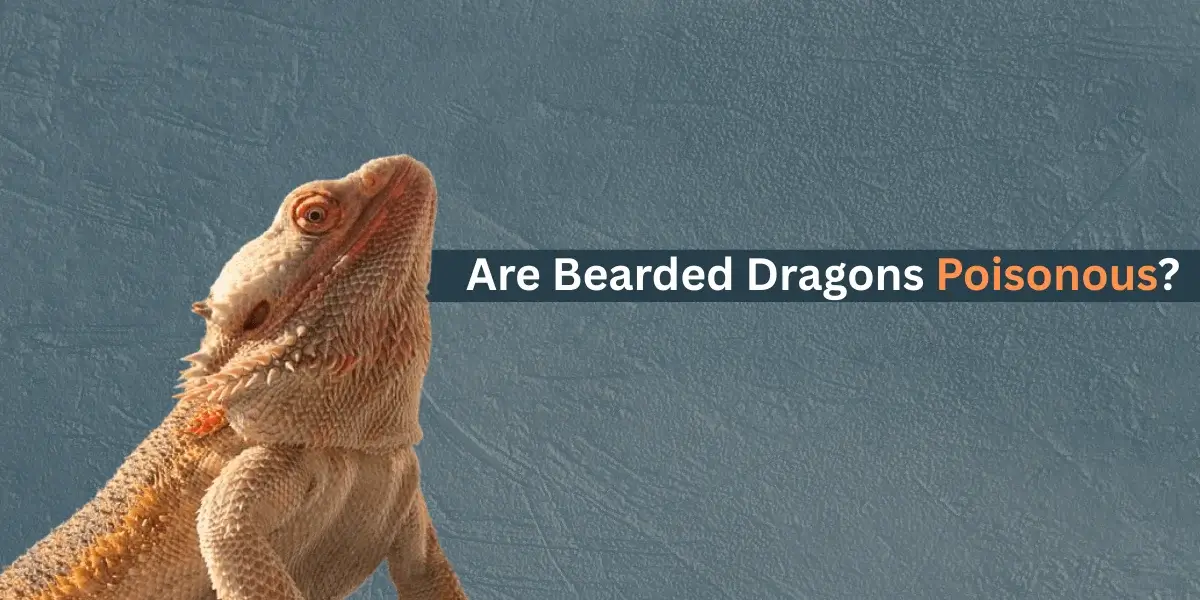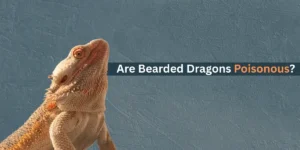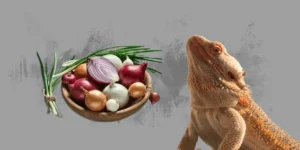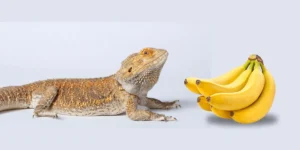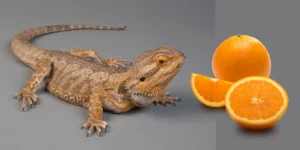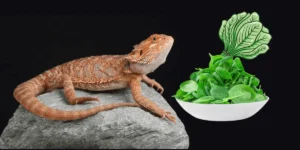Many people wonder if bearded dragons are poisonous, especially since some reptiles produce toxins. The short answer is no—bearded dragons are not poisonous, and they do not secrete substances that harm humans when touched or swallowed.
However, there is often confusion because bearded dragons produce mild venom, but venom is different from poison. While poison is dangerous when swallowed, absorbed, or inhaled, venom must enter the bloodstream via a bite to have an effect. For humans, the venom of a bearded dragon is mild and not harmful, unless someone has an allergic reaction.
Poison vs Venom – Understanding the Difference
Many people use the words poisonous and venomous interchangeably, but they are not the same.
- Poison: A substance that can cause harm if swallowed, absorbed through skin, or inhaled.
- Venom: A specialized type of toxin injected through a bite or sting.
Bearded dragons do not secrete poison, so they cannot harm you by touch or ingestion. Their mild venom is primarily used to immobilize prey like insects, and it is not dangerous for humans. This is why scientists classify them as venomous lizards, not poisonous ones.
Key Takeaway: The myth that bearded dragons are poisonous is false. They are safe pets if handled properly.
Are Bearded Dragons Dangerous to Humans?
While bearded dragons are not poisonous, people often worry about bites or diseases like salmonella. These are the real risks, not poison.
Bites
- Frequency: Rare; usually only if the dragon feels threatened or stressed.
- Effects: Minor pain, swelling, or bleeding due to their small but sharp teeth.
- Precaution: Monitor any bite for infection and clean the wound.
Salmonella
Bearded dragons can carry salmonella bacteria, which may cause illness in humans if proper hygiene is not followed.
Preventive measures:
- Wash hands thoroughly after handling your pet.
- Clean the terrarium regularly.
- Avoid letting children put their hands in their mouths after touching the dragon.
Environmental & Household Risks
Even though the dragon itself isn’t poisonous, toxicity can come from external sources like:
- Certain houseplants (e.g., lilies, oleander).
- Chemicals, fertilizers, or pesticides.
- Spoiled food or unsafe human foods.
- Household cleaners, scented candles, air fresheners, or medications.
Symptoms of toxicity in bearded dragons include vomiting, diarrhea, lethargy, refusal to eat, or unusual behaviors. If you notice these, remove the substance immediately, provide clean water, and contact a reptile-specialist veterinarian.
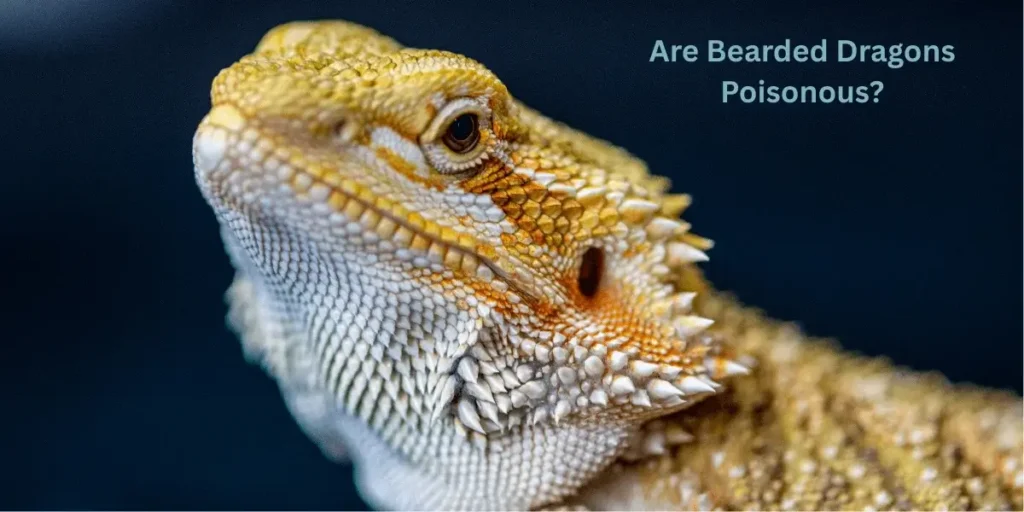
Bearded Dragon Safety Risks
| Risk | Possible Effect | Recommended Action |
| Bite | Minor swelling, bleeding | Clean wound, monitor, apply antibiotic ointment if needed |
| Salmonella | Nausea, diarrhea | Wash hands, disinfect surfaces, avoid cross-contact |
| Toxic plant ingestion | Mild digestive upset | Remove substance, offer water, call vet if persistent |
| Household chemicals | Vomiting, lethargy | Remove from exposure, clean habitat, seek vet advice |
Tip: Knowing your dragon’s behavior is key. Signs of stress include puffing out the beard, darkening of the beard, or frantic movements. Avoid handling during these times.
Handling Young or Sensitive Dragons
Young bearded dragons are often more delicate and sensitive compared to adult beardies. Their immune systems are still developing, which means they can get stressed more easily. Stress can weaken their health, making them more prone to minor infections or digestive issues. That’s why it’s very important to handle them carefully and keep their environment safe.
Things to keep in mind:
- Supervise children: Kids may not understand how fragile a young dragon is. Always guide them on gentle handling and never allow rough play.
- Avoid unsafe exposure: Household chemicals, cleaning sprays, perfumes, and even some plants can be harmful. Just like you wouldn’t give your beardie toxic foods such as avocado or onions, be careful with environmental toxins too.
- Watch behavior closely: If your beardie looks restless, darkens its beard, or refuses food, it may be stressed or unwell.
Tip: Though very rare, some people can experience mild allergic reactions when handling bearded dragons due to their saliva or tiny venom traces. If you or your child has a known sensitivity, wear gloves or wash hands after handling.
For healthier growth, feed them a balanced diet with safe fruits and veggies. For example, young dragons can occasionally enjoy fruits like pineapple, blackberries, or oranges in small portions, but their main diet should still be protein (insects) and leafy greens.
Preventing Bites and Stress in Bearded Dragons
Bearded dragon bites are extremely rare and usually happen only if the dragon feels scared or mishandled. Their small teeth and mild venom are not dangerous to humans, but prevention is always better than cure.
How to prevent bites and stress:
- Know your dragon: Watch for stress signals such as beard puffing, gaping mouth, or body darkening. If your dragon looks defensive, give it time to calm down before handling.
- Proper handling: Always lift gently from the side, never from above. Support the body with both hands so your dragon feels secure.
- Safe feeding: Instead of hand-feeding, use tweezers or a shallow dish. This avoids accidental nips while also keeping feeding hygienic.
Takeaway: Your bearded dragon’s venom is mild and not harmful, but reducing stress through proper care helps keep both you and your pet happy.
Symptoms & Effects of Toxic Exposure
While bearded dragons themselves are not poisonous or harmful to humans, they can get sick if they consume toxic foods or come into contact with unsafe substances. Owners must understand the warning signs early to act quickly.
Common symptoms of toxicity in bearded dragons include:
- Vomiting or diarrhea
- Unusual lethargy or weakness
- Refusal to eat favorite foods
- Sudden color changes or abnormal behaviors
If you notice these signs, take immediate steps:
- Remove the harmful substance or food right away.
- Offer clean, fresh water to help flush the system.
- Contact a reptile-specialized veterinarian for advice.
Examples of toxic foods: Avocado, rhubarb, and onions should never be fed. Even citrus fruits like oranges should only be given occasionally, since too much acidity can upset their stomach. Safer alternatives include blackberries, strawberries, and blueberries in moderation.
Conclusion
Bearded dragons are not poisonous, and most myths about poison in beardies are false. While they do produce mild venom, it is harmless to humans under normal circumstances. The real safety concerns come from bites, stress, or potential salmonella exposure. With proper care, hygiene, and handling, your bearded dragon is a safe and fascinating pet.
No. Bearded dragons do not secrete toxins that can harm humans through touch or ingestion.
No. Bearded dragons are not toxic animals.
No. They only produce mild venom for hunting insects. This venom is not poisonous to humans.
Generally safe. The main concern is proper care, hygiene, and preventing bites during feeding.
Remove the substance immediately, rinse if needed, monitor for symptoms, and contact a reptile vet.

